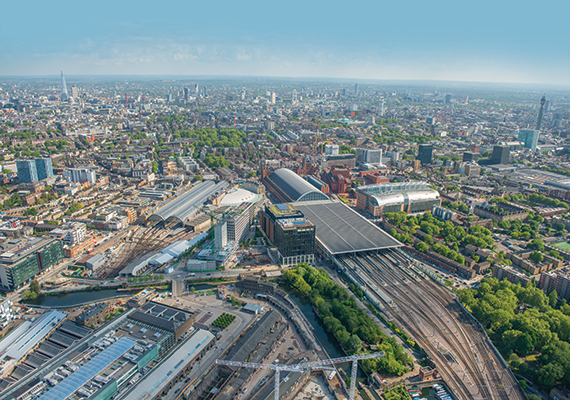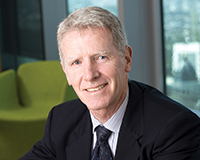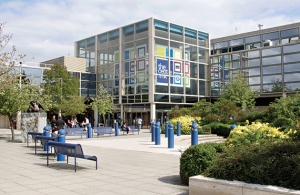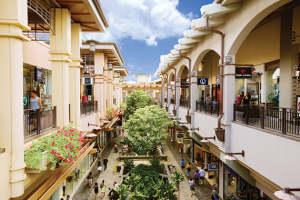 There is no superannuation fund bigger, better or more sophisticated in Australia than AustralianSuper. The Melbourne-based giant has just under 10% of its A$91bn (£44.5bn ) empire within real estate. With grand plans to widen its reach overseas, the fund is now focused on boosting that figure to up to 12% over the medium term.
There is no superannuation fund bigger, better or more sophisticated in Australia than AustralianSuper. The Melbourne-based giant has just under 10% of its A$91bn (£44.5bn ) empire within real estate. With grand plans to widen its reach overseas, the fund is now focused on boosting that figure to up to 12% over the medium term.
Last week the fund spent £432m on a 42.5% stake in King’s Cross, N1.
 The purchase from the government and DHL follows an initial deal to secure a 25% stake in the 67-acre development project King’s Cross in March last year for £200m. The two purchases combined means the fund now owns 67.5% of one of London’s most high-profile regeneration projects.
The purchase from the government and DHL follows an initial deal to secure a 25% stake in the 67-acre development project King’s Cross in March last year for £200m. The two purchases combined means the fund now owns 67.5% of one of London’s most high-profile regeneration projects.
With new offices due to open in the UK and America this year, there is little question that the King’s Cross deal – though colossal in its own right – is just the tip of the AusSuper iceberg.
Here, the fund’s head of property Jack McGougan explains how he will take AusSuper’s non-domestic property portfolio from 30% to 50% in the next three to four years, and why he is in no hurry to grow his agile team.
Perfect 10
For such an ambitious growth strategy, McGougan has just 10 people working for him in the real estate division. This small group works feverishly to cover a multitude of geographies. And plans to open those UK and US offices are at the top of the agenda.

This is down to necessity rather than design. McGougan, a Scot who immigrated to Australia in 1956, had to implement the plan back in 2011 as the fund’s inflows swelled after the global financial crisis.
He decided that AusSuper had to ditch its model of investing into co-mingled funds and private equity funds, some of which had provided disastrous returns during the downturn. This included investment into funds run by the likes of Morgan Stanley Real Estate Funds and MGPA, which were highly geared and became distressed once asset values collapsed at the height of the recession.
Convincing his bosses that more cash should be channelled to international real estate was not a straightforward task, given how badly AusSuper and other Australian institutions had been burnt.
“We had to build the case for approaching international investment in a different way,” says McGougan. “We didn’t have the luxury of putting 50 people on the ground, so it was looking at how best to invest directly without having a big internal team.”
The new investment model had a few crucial fundamentals. Firstly, the investment would be in lower-risk real estate, albeit taking on development to meet returns where appropriate. It also empowered a handful of fund managers to each take on specific mandates for particular geographies or sectors. These work as segregated mandates and it does not invest within co-mingled funds.
In 2013 it appointed TH Real Estate to purchase UK shopping centres and QIC to buy US retail.
In 2015 it followed this by appointing TH Real Estate to also buy central London offices, Principal Investment Grouop to buy US offices, and Rocksring to buy European offices and retail.
Somewhat against the trend of investors wanting managers to have “skin in the game”, AusSuper does enter joint ventures but does not allow its managers to co-invest at all as it considers itself “responsible and accountable” for its own decisions.

“We don’t want to be involved in the day-to-day asset management but we want to be able to control our own destiny in terms of the strategy for an asset, the annual business plan, managing capex, all those things,” says McGougan.
When it comes to culture and investment attitudes, AusSuper – which was formed in 2006 through the merger of Australia’s two largest industry superfunds for workers, the Australian Retirement Fund and Superannuation Trust of Australia – is unusual in that it tends to pay lower fees to managers. This is in contrast to the retail funds run by banks, and is a trait of its unionist routes, says McGougan.
“There’s a line of sight between what you are doing and the benefits to the member,” he adds. “You don’t have the distractions that you have in a fund management organisation, where it’s all about amount of assets under management and fees.
“It’s a more purist investment model and I love that. The vast bulk of our members are not millionaires, they tend not to be rich people. The average balance is very low and there are lots of immigrants and part-time workers that are members.”
Overseas expansion
In terms of the fund’s plans for overseas expansion, McGougan insists that despite such a big push, he does not see the need for headcount to go up all that much. “You don’t need a big team of people to be able to do that but it helps if they’re in the market and they’re there.”
When it opens, the UK office will be in London, from which Europe will be covered and run by Dan Berger, who already oversees the region from Australia. The fund is yet to determine its location for a US office.
As for its European strategy, AusSuper has already made a name in the UK with the King’s Cross deals. And it debuted back in 2013, buying a 50% stake in the Centre:MK in Milton Keynes for £270m.
“Large mixed-use projects such as King’s Cross are exactly the sort of projects we want to be doing in major cities around the world if we can get the opportunities,” says McGougan.
“King’s Cross was an opportunity to get exposure
to prime London offices in an area that’s emerging. If you look at rental levels, the differential between the West End and King’s Cross is still huge.”
Within continental Europe, AusSuper is being cautious and is yet to invest alongside its designated manager Rockspring. It is not considering opportunities in southern European markets, despite their relative recovery.
“At the risk of offending our Italian and Spanish friends, we probably won’t be going there, or Greece,” says McGougan.
But in the US, it has been far more active. In June, it purchased a 49% stake in an eight-building Washington office portfolio valued at $1.3bn (£910m) from Brookfield, and the previous month bought a 49% stake in 75 State Street in Boston from the same partner for $296m.
“Washington is a supply-constrained market, with restrictions on height and, notwithstanding the depth
of government, demand has dropped away post the global financial crisis. But it comes back, it’s a good long-term market. In Boston the asset was in the financial district which we think is having something of a resurgence,” says McGougan.
On the retail front, in March AusSuper bought a 25% stake in Honolulu’s Ala Moana Centre for $1.1bn from General Growth Properties.
The 2.1m sq ft mall is the world’s largest open-air shopping centre and is in the process of being expanded by
a further 650,000 sq ft.
“We’ve got a bias towards super regional retail or fortress malls as they call it in the US,” says McGougan. “We have felt for a while, and I have held the view through my career, that they are very resilient assets, and if they’re managed properly and actively, you retain a dominant position in the market and they perform very well.”
Back on home turf
It may be spreading its wings and splashing the cash on the international front, but AusSuper was a net seller in its home market throughout 2015. It is selling 420 George Street and the attached MidCity shopping centre in Sydney for A$900m.
“We are not going to sell the whole portfolio but we do think pricing has peaked and the reason is the weight of capital that is driving down yields. It is not underpinned by any sensible assumptions about rental growth, I don’t think.”
With such a small team and a large and growing portfolio, even having engaged a variety of specialist managers in different geographies, McGougan has been doing a lot of travelling this year, often taking in Asia, Europe and the US in one trip.
Once the offices in the UK and US are open, such trips might become a little less frequent although, if he gets his way, he might still be lured into a bit of more jetsetting.
“We haven’t decided where the US office will be,” he says. “It might be New York, but to be honest I think I’d rather it was Hawaii.”
To send feedback, e-mail david.hatcher@estatesgazette.com or tweet @hatcherdavid or @estatesgazette










